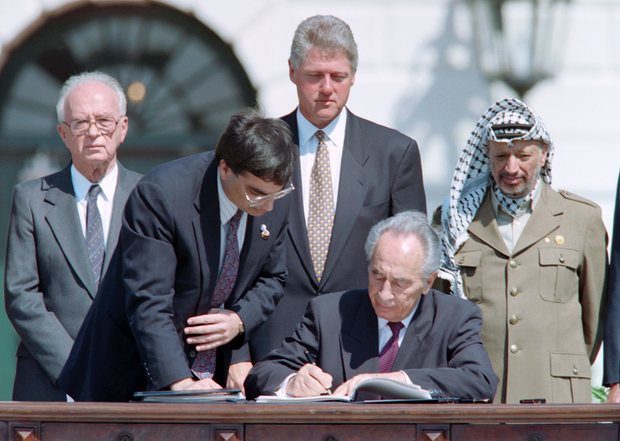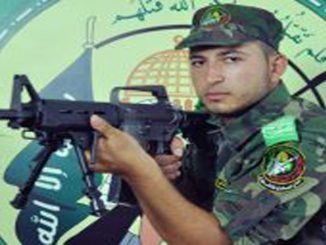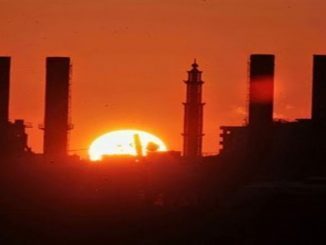
The Palestinian resistance movements have slammed the participation of Palestinian Authority President Mahmoud Abbas in the funeral of Shimon Peres the former Israeli president.
Mahmoud Abbas attended the funeral of former Israeli President Shimon Peres on Friday, in spite of critiques from rival Palestinian political factions.
Israeli Prime Minister Benjamin Netanyahu and Palestinian President Mahmoud Abbas shook hands at the funeral of former Israeli President Shimon Peres at Jerusalem’s Mount Herzl Cemetery, according to Anadolu Agency.
However, Hamas movement had urged Abbas not to go to Peres’ funeral, saying that such a move would encourage normalization with Israel to the detriment of the Palestinian cause.
Gaza-based Palestinian resistance movement Hamas, for its part, slammed Abbas’ decision to attend the event.
“Abbas participation at Peres’ funeral makes a mockery of the bloody sacrifices made by the Palestinian people,” Hamas spokesman Sami Abu Zuhri told Anadolu Agency.
Abu Zuhri went on to describe the late Israeli leader as a “war criminal responsible for killing hundreds of innocent people”.
Meanwhile, the Popular Resistance Committees condemned the presence of Abbas, as well as Arab and Islamic delegations, at the funeral, saying that paying respects to one of Israel’s “biggest criminals” was “disregarding the feelings and sacrifices of the Palestinian people” and gave Israel “a pass for its crimes.”
The movement went on to say that Peres was never a “peace dove,” but a “bloodthirsty assassin,” and call for a boycott of Israel and efforts to take its leaders to court for the crimes they committed.
In a demonstration organized after Friday noon prayers in Gaza City, participants set fire to posters and effigies of Peres, Netanyahu, and US President Barack Obama.
Peres was born in modern-day Belarus but moved to British-mandated Palestine in the 1930s. He later joined the Haganah, an armed Jewish gang that carried out numerous attacks on Palestinian civilians after the withdrawal of British forces from Palestine in 1948.
Peres received the 1994 Nobel Peace Prize — along with late Israeli Prime Minister Yitzhak Rabin and late Palestinian leader Yasser Arafat — for his role in peace talks that later yielded the Oslo Accords.
Peres has been accused of committing egregious rights violations, however, including the shelling of the southern Lebanese village of Qana in 1996 — when he was Israel’s prime minister — in which 106 Lebanese civilians were killed.
Abbas’ Fatah movement, the ruling party in the Palestinian Authority (PA) said in a statement that Abbas’ presence at the funeral was part of his responsibilities as president, particularly at such a widely watched event.
The head of Fatah’s media committee, Munir al-Jaghoub, said that Abbas’ attendance would disprove Israeli claims that Palestinians only believe in violence, and that going showed his responsibility as a leader.
“We are facing the political importance of the president attending the funeral, and his participation forces us as Palestinians to realize what is behind this step and the strong message of Palestinian peace sent to the world,” al-Jaghoub said.
During the funeral, Abbas was accompanied by a delegation of senior Palestinian officials, including Palestine Liberation Organization (PLO) Secretary-General Saeb Erekat and Palestinian Civil Affairs Minister Hussein al-Sheikh.
Abbas was among dozens of world leaders who attended the funeral of Peres, who passed away early Wednesday at the age of 93, two weeks after suffering a stroke.
Abbas met with Israeli Prime Minister Benjamin Netanyahu ahead of the ceremony, when he told Netanyahu that they had not met in a long time, to which Netanyahu responded that he appreciated Abbas’ presence at the funeral.
Israeli forces and police imposed strict restrictions in Jerusalem ahead of the funeral, attended by scores of delegations from foreign countries, including US President Barack Obama, Jordanian Deputy Prime Minister Jawad al-Anani, Egyptian Minister of Foreign Affairs Samih Shukri, and the Omani ambassador to Jordan.
A large number of roads were closed off, and an agreement allowing 250 Palestinian worshipers from the Gaza Strip to visit the Al-Aqsa Mosque on Friday was suspended.



